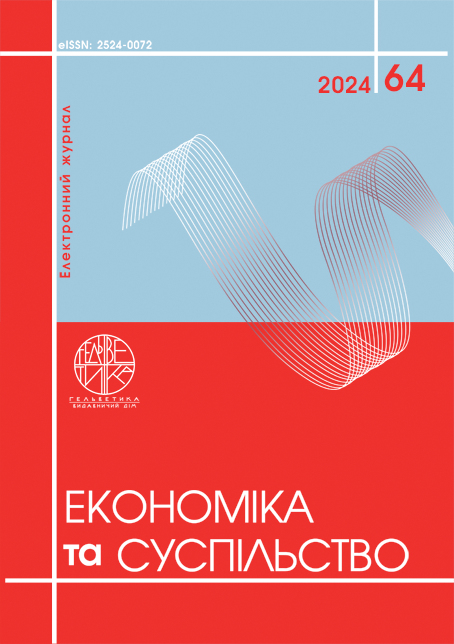PRIORITIES OF ECONOMIC DEVELOPMENT IN THE CONDITIONS OF POST-WAR RECOVERY: ANALYSIS OF GLOBAL EXPERIENCE
Abstract
The article is devoted to a comprehensive analysis of the priorities and strategies of economic recovery in the post-war period, based on the experience of different countries and taking into account the possibilities of its application in Ukraine. The issue of post-war reconstruction is highly relevant for countries affected by armed conflicts, especially in the context of russia's current war against Ukraine. The study aims to summarise international experience and develop recommendations for Ukraine's effective post-war recovery. The main focus is studying the successful practices of other countries, such as Croatia, to adapt them to Ukrainian realities. The study analyzes scientific publications, theoretical concepts, and empirical data on post-war economic recovery. Benchmarking methods were used to identify critical aspects of successful recovery strategies. The analysis includes an overview of economic development theories, institutional reforms, infrastructure investment, and human capital. The results of the study indicate that a comprehensive approach to post-war recovery, which includes infrastructure reconstruction, economic reforms, human capital development, effective use of international aid, and institutional reforms, is critical to the successful recovery of Ukraine. In particular, the experience of Croatia shows the importance of strategic planning, localized projects, and European integration as catalysts for reforms. In addition, the study highlights the importance of coordinating international aid and ensuring governance transparency to increase trust between the government and society. The article's practical value lies in providing specific recommendations for the government of Ukraine and international organizations regarding effective post-war recovery. Proposed directions include strategic planning for the restoration of critical infrastructure, acceleration of privatization of state-owned enterprises, support for small and medium-sized businesses, educational reforms and vocational training, coordination of international aid, and institutional reforms. Implementing these recommendations will contribute to Ukraine's sustainable development and ensure social stability in the post-war period.
References
Acemoglu D., Johnson S., Robinson J. A. The Colonial Origins of Comparative Development: An Empirical Investigation. American Economic Review. 2001. № 91(5). P. 1369–1401. DOI: https://doi.org/10.1257/aer.91.5.1369
Addison T., Chowdhury A. R., Murshed S. M. By How Much Does Conflict Reduce Financial Development? World Institute for Development Economics Research. 2002. URL: https://epublications.marquette.edu/cgi/viewcontent.cgi?article=1491&context=econ_fac
Arndt Ch., Jones S., Tarp, F. Aid, Growth, and Development: Have We Come Full Circle?. Journal of Globalization and Development. 2010. Vol. 1. Article 5. DOI: https://doi.org/10.2202/1948-1837.1121
Becker G. S. Human Capital: A Theoretical and Empirical Analysis, with Special Reference to Education (3rd ed.). University of Chicago Press, 1993. 392 p. DOI: https://doi.org/10.7208/chicago/9780226041223.001.0001
Bicanic I., Franičević V. Understanding reform: The case of Croatia. 2003. URL: https://wiiw.ac.at/understanding-reform-the-case-of-croatia-dlp-3287.pdf
Collier P., Hoeffler A. Greed and Grievance in Civil War. Oxford Economic Papers. 2004. № 56(4). P. 563–595. DOI: https://doi.org/10.1093/oep/gpf064
De Long J. B., Eichengreen B. The Marshall Plan: History's Most Successful Structural Adjustment Program. National Bureau of Economic Research. Working Paper. 1991. № 3899. DOI: https://doi.org/10.3386/w3899
Knack S. Aid Dependence and the Quality of Governance: Cross-Country Empirical Tests. Southern Economic Journal. 2001. № 68. P. 310–329. DOI: https://doi.org/10.2307/1061596.
Noy I., Vu T. B. The Economics of Natural Disasters in a Developing Country: The Case of Vietnam. Journal of Asian Economics. 2010. № 21(4). P. 345–354. DOI: https://doi.org/10.1016/j.asieco.2010.03.002
Paris R. At War’s End: Building Peace after Civil Conflict. Cambridge: Cambridge University Press, 2004. 304 p. DOI: https://doi.org/10.1017/CBO9780511790836
Stepputat F. Global Governance and the New Wars: The Merging of Development and Security. Journal of Refugee Studies. 2002. № 15. P. 120–121. DOI: https://doi.org/10.1093/jrs/15.1.120
Tanner M. Croatia: A nation forged in war (2nd ed.). Yale University Press, 2010. 384 p. DOI: https://www.jstor.org/stable/j.ctt1npzsd
Acemoglu, D., Johnson, S., Robinson, J. A. (2001). The Colonial Origins of Comparative Development: An Empirical Investigation. American Economic Review, 91(5), 1369–1401. DOI: https://doi.org/10.1257/aer.91.5.1369
Addison, T., Chowdhury, A. R., Murshed, S. M. (2002). By How Much Does Conflict Reduce Financial Development? World Institute for Development Economics Research. Available at: https://epublications.marquette.edu/cgi/viewcontent.cgi?article=1491&context=econ_fac
Arndt, Ch., Jones, S. Tarp, F. (2010). Aid, Growth, and Development: Have We Come Full Circle?. Journal of Globalization and Development, Vol. 1. Article 5. DOI: https://doi.org/10.2202/1948-1837.1121
Becker, G. S. (1993). Human Capital: A Theoretical and Empirical Analysis, with Special Reference to Education (3rd ed.), University of Chicago Press. DOI: https://doi.org/10.7208/chicago/9780226041223.001.0001
Bicanic, I., Franičević, V. (2003). Understanding reform: The case of Croatia. Available at: https://wiiw.ac.at/understanding-reform-the-case-of-croatia-dlp-3287.pdf
Collier, P., Hoeffler, A. (2004). Greed and Grievance in Civil War. Oxford Economic Papers, 56(4), 563–595. DOI: https://doi.org/10.1093/oep/gpf064
De Long, J. B., Eichengreen, B. (1991). The Marshall Plan: History's Most Successful Structural Adjustment Program. National Bureau of Economic Research. Working Paper No. 3899. DOI: https://doi.org/10.3386/w3899
Knack, S. (2001). Aid Dependence and the Quality of Governance: Cross-Country Empirical Tests. Southern Economic Journal, 68, 310–329. DOI: https://doi.org/10.2307/1061596
Noy, I., Vu, T. B. (2010). The Economics of Natural Disasters in a Developing Country: The Case of Vietnam. Journal of Asian Economics, 21(4), 345–354. DOI: https://doi.org/10.1016/j.asieco.2010.03.002
Paris, R. (2004). At War’s End: Building Peace after Civil Conflict, Cambridge: Cambridge University Press. DOI: https://doi.org/10.1017/CBO9780511790836
Stepputat, F. (2002). Global Governance and the New Wars: The Merging of Development and Security. Journal of Refugee Studies, 15, 120–121. DOI: https://doi.org/10.1093/jrs/15.1.120
Tanner, M. (2010). Croatia: A nation forged in war (2nd ed.), Yale University Press. Available at: https://www.jstor.org/stable/j.ctt1npzsd


